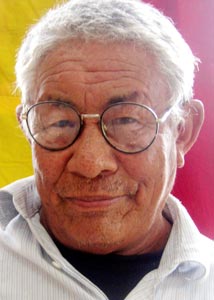Name: Tsering Palden
(Alias: No)
Gender: Male
Interview Age: 73
Date of Birth: 1935
Birthplace: Doomba, Utsang, Tibet
Year Left Tibet: 1959
Profession: Dairy Farming
Monk/Nun: No
Political Prisoner: No

Interview No.: 15
Date: 2007-06-28
Language: Tibetan
Location: Lugsung Samdupling Settlement, Bylakuppe, Karnataka, India
Categories: Culture and History
Keywords: Chinese rule -- life under, customs/traditions, escape experiences, houses/villages, marriage practices, nomadic life, trade, Utsang
Summary:
Tsering Palden's large family lived as nomads in a remote area, who exchanged animal products for rice, wheat and other goods in Bhutan and among Tibetans. He explains why his village, Doomba, is highly respected by the Tibetans and he describes the legend behind the hills and mountain near his village. In exchange for guarding the border with Bhutan, the people of his village were given the right to sell incense "at any distance the white bird could fly for 18 days."
Tsering Palden gives many details about marriage customs. He says, "Here [in India] you have something called falling in love, in Tibet it was in the parents' hands." When Tsering Palden was 19, his family brought a girl from another place and told him she was his bride. He explains how parents matched the zodiac signs for each couple and consulted lamas for divination and astrological calculations before a marriage is decided.
The Chinese did not arrive in Tsering Palden's region until around 1958. Daily life was disrupted as the Chinese began giving silver coins to the poor and appointing them to leadership positions while subjecting the original village leaders to thamzing 'struggles sessions.' He provides an account of his return to Tibet in 1994 to visit his relatives and describes the changes that have taken place in Tibet.
Interview Team:
- Rebecca Novick (Interviewer)
- Ronny Novick (Videographer)
- Tsering Dorjee (Interpreter)

